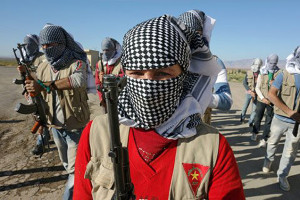
How will then the up-coming meeting between Donald Trump and Turkey’s Erdogan, during the latter’s visit to the US on May 17-17, end up? The meeting is to be followed by a NATO summit on May 25 where important questions, including Turkey’s role as a NATO ally, are likely to come up and debated amidst a potentially explosive environment.
Turkey, sensing the tense situation, has been lobbying for changing the US position vis-à-vis Kurds’ role in Raqqa. But the Trump administration’s decision to arm Kurds has turned out to be another, if not final, nail in the coffin of Turkey’s anti Kurd operations, which have seen a halt since the last time it attached YPG units. To dissuade Turkey from launching “hot pursuit” inside the Syrian territory, the US has deployed its troops on the Syria-Turkey border, while the Russians have done the same in Efrin.
Whereas this closure has led Turkey to conclude that both the US and Russia are using Kurds as pawns in their bid to capture and control Syria, what the Turkish officials remain oblivious to is the fact that the US support for the Kurds has only steadily increased over the years, particularly since it became clear to the Pentagon that Free Syrian Army (FSA), a coalition of Arab forces that Turkey also supported, was not only ineffective in terms of its fighting capacity but also beset by internal disunity.
For Turkey, this decision represents a red line and is likely to provoke it into taking steps to counter-act Kurdish ascendance, most probably by allowing Sunni militias, also known as “rebels”, to spread in parts of Syria, particularly in the north, and neutralize Kurdish gains and the prospects of the establishment of Kurdistan.
The plan, as some pro-Erdogan Turkish media have signified in the past, seems to be to bring northern Syria under Turkish control and make it a de-fact0 82nd province. Turkey is building this scenario on the possibility of Kurdish forces stirring up Sunni-Arab population of the region. While it may not necessarily lead to the revival of the Islamic State and while Kurdish militias might not even unleash such a terrible-scenario, Turkey might still be able to manufacture crisis given that Turkey-backed “rebels” have had a visible presence in parts of Syria and have widely projected their objectives on the social media where they could be seen as earl as January chanting, apart from other things, “Long Live Turkey”!
Therefore, while the US officials have said that Kurdish militias will not be allowed to operate an independent course of action, the US plan is devoid of a contingent part to make sure that the liberation of Raqqa does not lead to the re-birth of ISIS, using a different name but professing the same ideology and deploying the same tactics.
Given the support Turkey is blamed to have provided to ISIS in the past and given the fact that it is pursuing a partition of Syria in a way that may allow it to consume a part of it, one can hardly ignore the possibility of revival of conflict and a fresh spread of terror groups in Syria and beyond.
After all, by now it has become clear to many that the liberation of Mosul in Iraq has not led to an abrupt end to the future prospects of another “Sunni insurgency” in Iraq as Al-Qaeda remains active and is, as some Western reports have indicated, planning to capitalize on the ISIS’ loses.
Will, therefore, the liberation of Raqqa lead to identical consequences? The on-going built up both by the US and Turkey show that liberation from ISIS might not simply end the conflict. At least, Turkey doesn’t seem to be prepared for that.
Turkey, under the ‘Erdoganized’ political system, is likely to increase the extent of its involvement in the name of “protecting its citizens living on the Turkey-Syria border region.” Already reports have started to emerge claiming that Turkey has formed a committee which is tasked with persuading the norther Syrians to facilitate a Turkish presence—something that Turkey would later on allow Turkey to present as a justifiable excuse to annex those parts of Syria, having a sizeable Turkish citizenry. A US senator recently seconded the prospects of Turkey potentially annexing norther Syria to shield itself against an ascending Kurdish state.
The crucial question for Trump administration, therefore, is not simply that of allying with Kurds to liberate Raqqa; it is also faced with the challenge of stemming the Turkish tide, a challenge that is likely to be discussed, and Turkey’s position revisited, in the up-coming NATO summit.
Salman Rafi Sheikh, research-analyst of International Relations and Pakistan’s foreign and domestic affairs, exclusively for the online magazine “New Eastern Outlook”.
